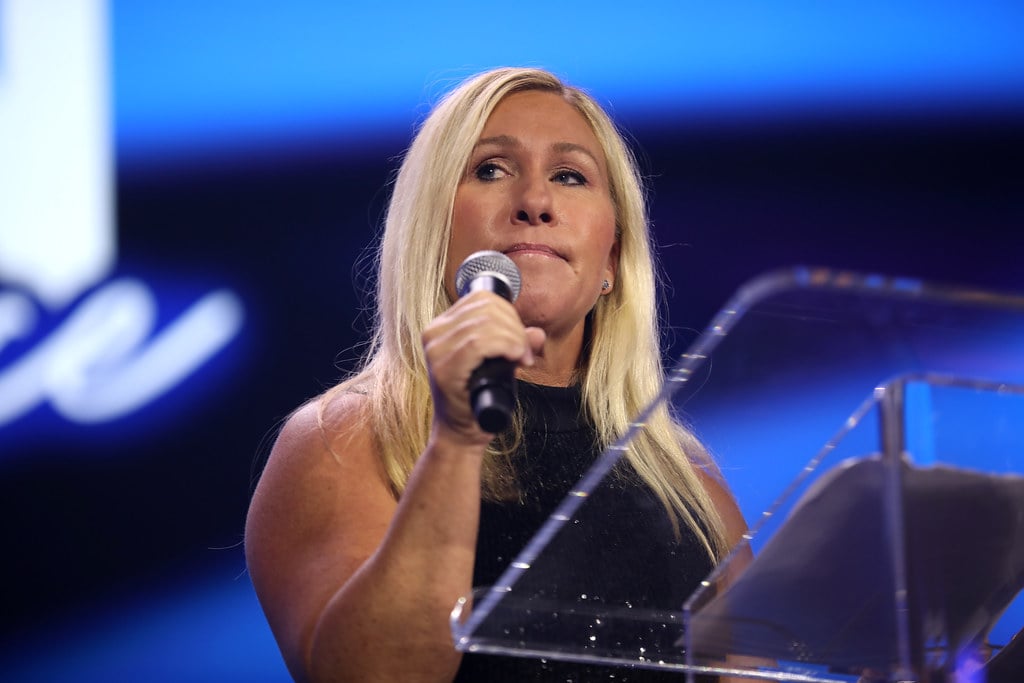Key Takeaways:
• Rep. Marjorie Taylor Greene openly blamed GOP leaders for the government shutdown.
• Hosts on MSNBC’s “The Weekend” burst into laughter at her rare criticism.
• The shutdown stalls over funding for ACA subsidies, risking coverage for millions.
• Greene’s break shows growing cracks in Republican unity as talks drag on.
Rep. Marjorie Taylor Greene stunned viewers by blaming GOP leaders for the government shutdown. Instead of targeting the president, she pointed fingers at the House Speaker and Senate Majority Leader. This rare move sparked laughter on MSNBC’s “The Weekend.” Yet her words may mark a key shift in the ongoing funding fight.
Greene’s Critique Shakes Government Shutdown Narrative
Unlike her usual stance, Greene did not defend her party’s top brass. She told CNN that Speaker Mike Johnson and Leader John Thune share the blame. Immediately, hosts Jonathan Capehart and Eugene Daniels burst out laughing. Capehart cheered, “Yes, Marjorie Taylor Greene!” Daniels noted it was “the first time this man has ever said that!” Later, Jacqueline Alemany added that political talk has changed since the shutdown began. She said Republicans now agree health care must be addressed but differ on timing.
What Led to the Government Shutdown Stalemate?
To understand Greene’s surprise, it helps to know why the government shutdown started. Lawmakers could not agree on a short-term funding bill. Republicans wanted a continuing resolution to buy time. They aimed to debate Affordable Care Act subsidies later. Democrats refused to back any bill that left out those funds. Without an extension, 4.8 million people could lose coverage. Also, premiums for 22 million might rise next year. As a result, the government has been partly closed for days.
How Greene’s Comments Changed the Tone
Greene’s critique adds fresh drama to the government shutdown story. First, it signals frustration among GOP hardliners. Second, it raises questions about party discipline as federal services stay offline. Moreover, her words highlight real stakes for everyday Americans. Hospitals, food programs, and parks all feel the impact. Parents and seniors now worry over lost services and delayed checks. Indeed, public pressure grows daily. Consequently, leaders on both sides face new urgency.
Next Steps in the Government Shutdown Fight
At this point, lawmakers have a few paths forward. They could pass a clean continuing resolution. Doing so would extend funding and keep the government open. Then they could tackle ACA subsidies in a separate bill. Alternatively, they might add health care funding now. However, some Republicans reject raising any spending. Meanwhile, Democrats demand clarity on coverage protections. As debates continue, each side hopes to sway a few holdouts. Notably, Greene’s stance may inspire other skeptics. In turn, this could tip the balance in favor of a deal.
Why the Shutdown Matters for Health Care
Beyond politics, the government shutdown has real health care effects. First, federal workers face delayed paychecks. Then, community health centers could lose grant funds. Also, oversight agencies may slow inspections. In short, patient safety and service quality risk slipping. Therefore, advocates urge swift resolution. They warn that even a short shutdown can disrupt vaccine programs and mental health support. As a result, more Americans feel anxious about access to care.
What Happens If Talks Fail?
If Congress fails to agree soon, the government shutdown will drag on. Essential services might resume, but many functions remain idle. People may skip routine screenings or delay prescription refills. Small businesses that rely on federal contracts could pause operations. Ultimately, the economic ripple could slow growth. For this reason, some Republicans warn that hardline tactics could backfire at the ballot box. Meanwhile, Democrats insist they will not yield on health care protections.
Conclusion
Marjorie Taylor Greene’s unexpected critique has added new life to the government shutdown debate. By breaking ranks, she shows growing unease within her party. At the same time, millions of Americans await action on health care funding. In the end, both sides face pressure to find a compromise soon. Otherwise, services will stay stalled and uncertainty will grow.
FAQs
How long has the government shutdown lasted?
As of this weekend, the shutdown has lasted eleven days. Lawmakers remain split over a funding plan.
What did Marjorie Taylor Greene blame for the shutdown?
She blamed House Speaker Mike Johnson and Senate Leader John Thune. She refused to blame the president.
What happens if ACA subsidies expire?
If subsidies end, about 4.8 million people could lose coverage. Additionally, 22 million Americans would face higher premiums.
Could other Republicans break ranks like Greene?
It’s possible. Greene’s rare public dissent may encourage others. Watching her shift, lawmakers could rethink their positions.
